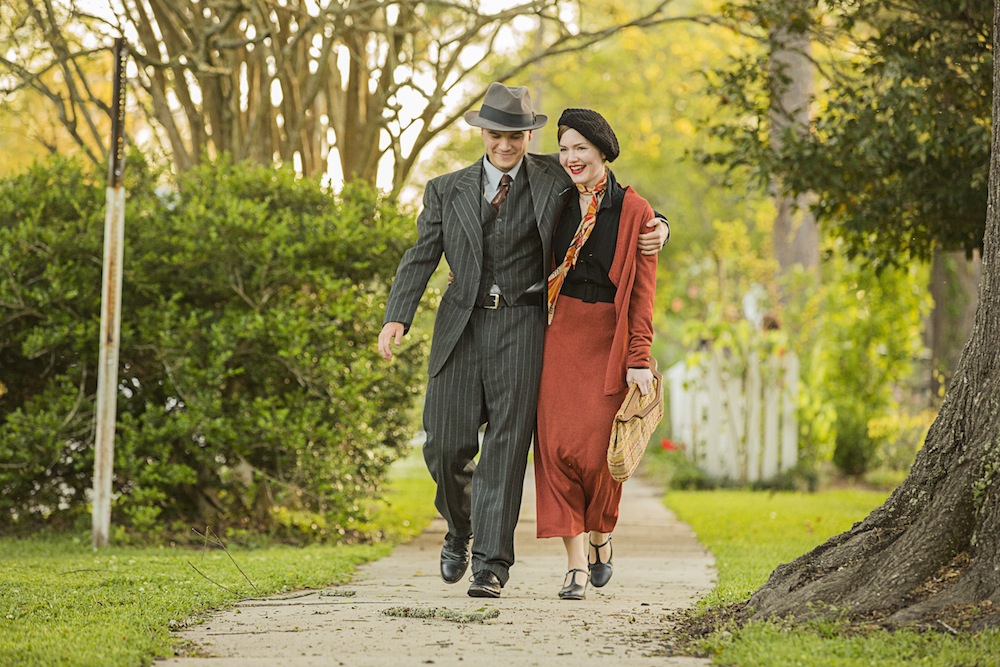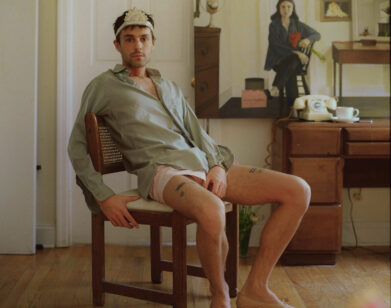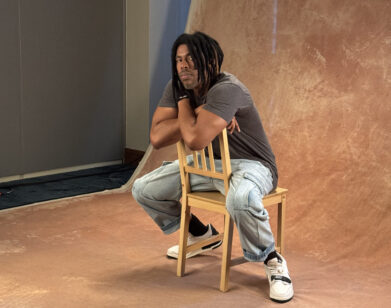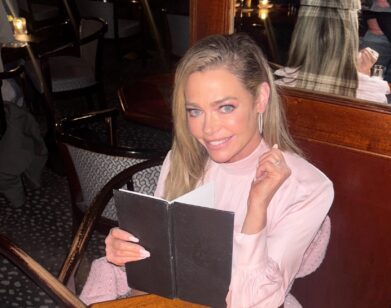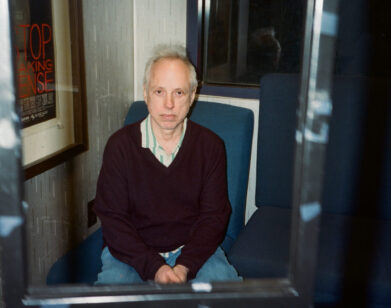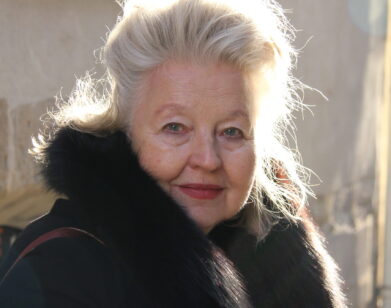Emile Hirsch, Original Gangster
Between Warren Beatty, Faye Dunaway, Serge Gainsbourg, and Brigitte Bardot, it’s easy to mistake Bonnie Parker and Clyde Barrow for fictitious folk heroes. But the infamous bank-robbing lovers were once real people. Bonnie wanted to be famous. With the help of Clyde, she settled for infamy.
A new two-part miniseries directed by the Oscar-nominated Bruce Beresford aims to ground Bonnie and Clyde in their place and time: Texas in the “dirty ’30s.” Played by The Borgias‘ Holliday Grainger, Beresford’s Bonnie is part Depression-era damsel, part femme fatale: too pretty for her dead-end Texas dust-bowl hometown, not well connected enough for Hollywood. Broken by stints in prison and a hopeless future, Beresford’s Clyde (Emile Hirsch) cares only for Bonnie and his family.
After a brief break from the spotlight, Emile Hirsch’s returned to form earlier this year with an enviable string of indies. He stole the show as the vacant Lance in David Gordon Green‘s delightful Prince Avalanche, romanced Penélope Cruz in Twice Born, and brooded alongside Stephen Dorff and Dakota Fanning in The Motel Life. Later this month, Hirsch will share the screen with Eric Bana, Ben Foster, Mark Wahlberg, and Taylor Kitsch in the SEAL drama Lone Survivor. Bonnie and Clyde is the 28-year-old actor’s first television job since 1999, when he guest-starred on ER, NYPD Blue, Sabrina the Teenage Witch, and Two of a Kind, among others. It is, however, hardly comparable. A clear product of twentyteens television, Bonnie and Clyde will air this weekend across three channels—A&E, The History Channel, and Lifetime.
We recently spoke with Hirsch over the phone from L.A.
EMMA BROWN: I had forgotten than Bonnie and Clyde were real people.
EMILE HIRSCH: I know, it’s pretty unbelievable that that actually happened.
BROWN: Did you approach them as real people or as characters?
HIRSCH: I tried to treat them as much as real people with specific personalities as I could. There’s a book called Go Down Together (2009) written by a guy named Jeff Gunn that became my main, go-to text in terms of the historical research. There have been a couple of revelations in the last 10 or 15 years; (Clyde’s sister-in-law) Blanche Barrow had a diary that she had written in prison that was lost and forgotten and then rediscovered. There were a lot of details in that that put some new light on some of the situations that she was in with Bonnie and Clyde: how Clyde got raped in prison, which was one of the big motivators for his rage at cops, one of the reasons for why he turned so dark and why there was so much violence between the two of them. A lot of it had to do with Clyde’s being hardened in prison and raped.
BROWN: Ben Foster interviewed you for us a few years ago about Alpha Dog. During the interview, you said that too much research can constrain you when you’re playing a character based on a real person. Did you feel differently for Bonnie and Clyde?
HIRSCH: In this case, the script kind of lined up with the things that I was learning and reading about Clyde, so I was able to play within the ideas of what I learned in a constructive way. It didn’t feel too inhibited. He’s a very specific person—it’s a specific character—but within the way the script was written, it worked pretty well. I was constrained; I couldn’t break into song with a British accent. I wasn’t spontaneously river dancing and juggling on set. That wasn’t going to work. But, within what I was working with, I felt pretty good. He’s a stoic, moody, internal guy. That’s Clyde.
BROWN: Do you consider Clyde an anti-hero, a villain, or neither?
HIRSCH: I view Clyde as a good guy who turned into a villain and hates himself for it. He had two different, conflicting desires: one was good and one was bad, and I think when he went to the dark side, he hated himself for it and that’s why what happens in the movie happens the way it does. He needs to be absolved.
BROWN: Do you think that things would have turned out differently for him had he never met Bonnie?
HIRSCH: Clyde probably would’ve been a small-time criminal. I don’t think he ever would have made it to the big times like John Dillinger or Baby Face Nelson. He would have never been on that level because he wasn’t a very skilled robber in terms of the actual buy and trade of being a criminal. He wasn’t particularly good. He was good at being on the run and he was good at driving and getting away and not being caught. He almost had a sixth sense in terms of escaping and avoiding dangerous situations before they happened to him, which is one of the reasons why he was on the run for so long. But I don’t think he had the skills of a criminal or the charisma to have been famous on his own. I think Bonnie really completed that piece of the puzzle—why they are the cultural icons that they are now around the whole world. She was the charming one.
BROWN: This is not the first time you’ve played a real-life criminal. Did you find that you had more sympathy for Clyde than your Alpha Dog (2007) character Johnny Truelove?
HIRSCH: That’s a hard answer. I never met the character Alpha Dog was based on, Jesse James Hollywood. I didn’t try to base my character off of him as a personality. I guess you could say I never met Clyde either, [but] I think that there’s something endearing about the fact that Bonnie and Clyde were truly in love with each other. There’s something endearing in that, even though they are committing these terrible acts. They are villains and there are doomed, [but] they did have a genuine love for each other that was very strong.
BROWN: I noticed Clyde’s tattoos.
HIRSCH: Yeah, those are all Clyde’s tattoos from photographs. He had a tattoo of a woman on his arm that was actually his first girlfriend, believe it or not. That’s kind of an odd historical fact. Bonnie was married before she was with Clyde. She was married when she was 16, and Clyde had had a couple girlfriends. They weren’t virgin lovers. They were people who dated and had crazy lives by the time they got together.
BROWN: What is the best advice you’ve ever gotten?
HIRSCH: Bruce Beresford told me a really great direction the first day we were shooting. It was Clyde’s reaction to Bonnie for the first time. I played the scene a little bit like Clyde was intimidated or almost shy when he first sees Bonnie at her wedding— when he sees her getting married to another guy. Bruce Beresford—great, legendary Australian director—he comes up to me and he goes, “You know, Emile, you have to remember, Clyde is a character from the Depression. He’s really tough. He sees Bonnie and he’s challenged and he wants her, but he’s not afraid. He’s going to go after the things he wants.” To me, it made so much sense—it’s kind of a badass vibe that he wanted from the look when Clyde sees Bonnie. He doesn’t break the gaze; he doesn’t look away, shy. That that direction really laid the rest of the performance in place for me, mentally.
BROWN: And did you have time to rehearse together with Holliday before you started filming?
HIRSCH: Yeah, Holliday and I had some really nice rehearsal time. A lot of it was dance training, too. We were working with a dance teacher for some of our dancing. We had a heck of a good time doing that—she’s a really great dancer, actually. And we would practice our accents. She’s English and I’m Southern Californian, so we would constantly be working on our Texan accents together and going over a lot of voice tapes that I had worked on with a vocal coach. We corrected each other’s accents and worked on certain words and really tried to nail down the Texan lingo.
BROWN: Was there any one were that was particularly difficult to say?
HIRSCH: Believe it or not, “Bonnie” was the hardest word to say, and I have to say the word a million times in the movie. The way that I would traditionally want to say it would be like [in a Texan accent] “Bownie,” where you kind of round out that “o.” But it’s actually “Bahnie” the way she pronounces it. I had to constantly keep myself in check on “Bahnie.” I literally think I said that word more than any other word in the movie.
BONNIE AND CLYDE AIRS THIS SUNDAY, DECEMBER 8, AND MONDAY, DECEMBER 9, ON A&E, THE HISTORY CHANNEL, AND LIFETIME.

